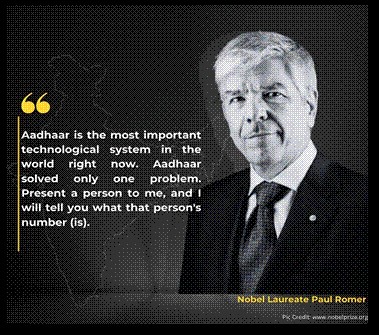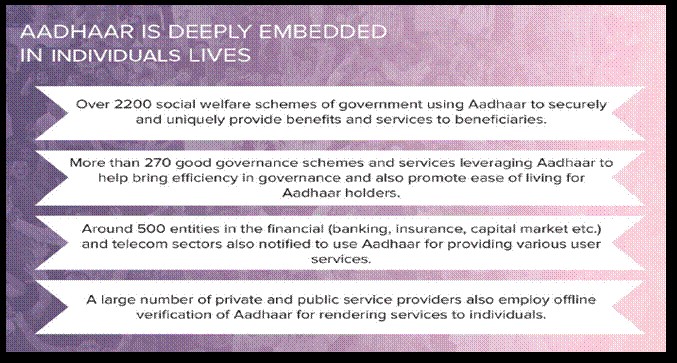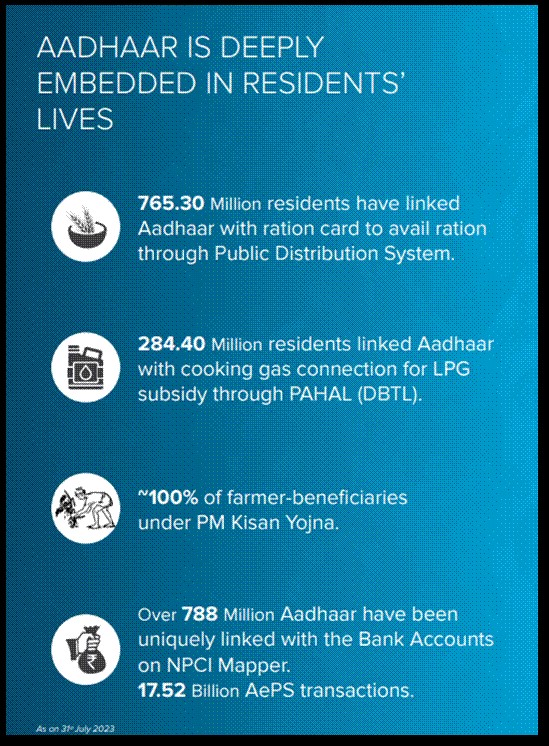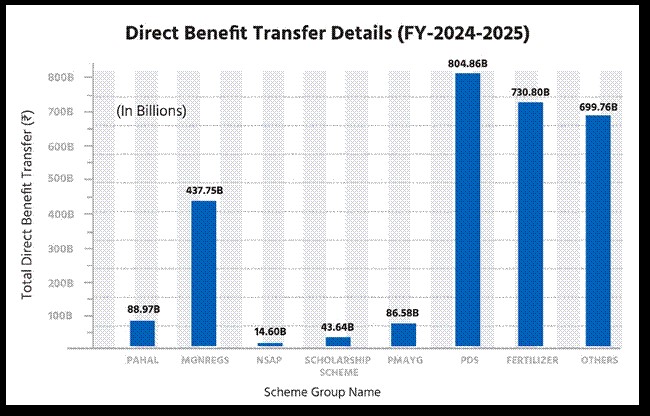Ministry of Electronics & IT
Aadhaar: A Unique Identity For The People
Nobel Laureate Praises Aadhaar
Posted On:
24 OCT 2024 8:50PM by PIB Delhi
Introduction
 Nobel laureate Paul Romer, who won the 2018 Economics Prize, recently praised India's Aadhaar system, calling it one of the most significant technological innovations globally. He highlighted how Aadhaar has laid a robust foundation for delivering government benefits, such as direct transfers, and has made public services more accessible to millions across the country. Romer's remarks have attracted international attention, as India’s technological advancements inspire other nations to consider similar approaches for reaching marginalized populations. Aadhaar has transformed lives by streamlining welfare delivery, eliminating fraud, and empowering citizens with a reliable and portable identity, thus fostering greater social inclusion and economic security.
Nobel laureate Paul Romer, who won the 2018 Economics Prize, recently praised India's Aadhaar system, calling it one of the most significant technological innovations globally. He highlighted how Aadhaar has laid a robust foundation for delivering government benefits, such as direct transfers, and has made public services more accessible to millions across the country. Romer's remarks have attracted international attention, as India’s technological advancements inspire other nations to consider similar approaches for reaching marginalized populations. Aadhaar has transformed lives by streamlining welfare delivery, eliminating fraud, and empowering citizens with a reliable and portable identity, thus fostering greater social inclusion and economic security.
Vision: To empower Aadhaar number holders of India with a unique identity and a digital platform to authenticate anytime, anywhere.
Aadhaar: Revolutionizing Technology Across India
Aadhaar, India's 12-digit unique identification number, has reshaped the nation's approach to identity verification and service delivery since its inception in 2009. The program was launched with a mission to provide every resident with a reliable, digitally verifiable identity using minimal demographic and biometric data. Aadhaar's robust authentication framework addresses long-standing issues of identity-related fraud and resource leakage by eliminating duplicate and fake identities. This ambitious initiative has grown into the world’s largest digital identity program, enabling authentication anytime, anywhere, and facilitating transparent, targeted distribution of services, benefits, and subsidies.

The establishment of the Unique Identification Authority of India (UIDAI) to oversee the issuance of Aadhaar marked a significant step forward. In 2016, UIDAI gained statutory status under the Aadhaar (Targeted Delivery of Financial and Other Subsidies, Benefits, and Services) Act, 2016, further solidifying its role in India’s governance. Over the years, Aadhaar's reach has expanded dramatically, with 138.04 crore Aadhaar numbers generated to date. It has become more than just an identity tool, fostering distributive justice, enhancing trust in government processes, and empowering millions by simplifying access to essential services. Today, Aadhaar stands as a cornerstone of India’s digital 1 and social infrastructure, with nearly every sixth person in the world holding this unique identification, symbolizing its transformative impact on society.

Aadhaar’s Role in Direct Benefit Transfer (DBT)
Aadhaar plays a critical role in enhancing the efficiency of social welfare schemes by offering a dependable, unified identity verification system that ensures transparency in service delivery. Through Aadhaar-linked Direct Benefit Transfers (DBT), launched in 2013, cash benefits from various welfare schemes are directly transferred into beneficiaries' bank accounts, reducing the need for multiple documents and eliminating duplicate or fake beneficiaries.

The Pradhan Mantri Jan Dhan Yojana (PMJDY) further promoted financial inclusion, opening over 523 million bank accounts, bringing marginalized sections into the formal financial system. This Aadhaar-driven approach has not only empowered people but also led to significant savings for the public exchequer by cleansing scheme databases, removing millions of fake, non-existent, and ineligible beneficiaries across multiple government ministries and departments. For example, Aadhaar-driven DBT has led to the elimination of over 4.15 crore fake LPG connections and 5.03 crore duplicate ration cards, streamlining the distribution of essential services like cooking gas and food subsidies.
Estimated Benefits/ Gains from DBT and Other Governance Reforms
|
S.No.
|
Ministry/Department
|
Estimated Gains
|
|
1
|
Ministry of Petroleum and Natural Gas
|
Elimination of 4.15 crore duplicate, fake/ non-existent, inactive LPG connections.
In addition, number of non-subsidised LPG consumers is 2.45 crore.
The aforesaid numbers (4.15 crore + 2.45 crore) include 1.13 crore 'Give-it-Up' consumers.
|
|
2
|
Department of Food and Public Distribution
|
Deletion of 5.0358 crore duplicate and fake/ non-existent Ration Cards.
|
|
3
|
Department of Rural Development
|
Deletion of 7.10 lakh fake Job Cards (FY 2022-23)
|
|
4
|
Department of Rural Development
|
Deletion of 11.05 lakh duplicate, fake/ non-existent, ineligible beneficiaries.
|
|
5
|
Ministry of Minority Affairs
|
Deletion of 30.92 lakh duplicate, fake/ non-existent beneficiaries.
|
|
6
|
Department of Social Justice and Empowerment
|
Deletion of 12.28 lakh duplicate, fake/non-existent beneficiaries.
|
|
7
|
Ministry of Women and Child Development
|
Reduction of 98.8 lakh duplicate, fake/non-existent beneficiaries.
|
|
8
|
Department of Fertilizers
|
Reduction of 158.06 Lakh Metric Tonnes of fertilizer sale to retailers.
|
|
9
|
Department of Agriculture and Farmers Welfare
|
Deletion of 2.1174 crore ineligible beneficiaries.
|
2. Supporting Marginalized Sections: Financial Inclusion and Direct Access to Services
Aadhaar has been a powerful tool in supporting marginalized communities. By linking Aadhaar to welfare programs and services through the JAM Trinity (Jan Dhan-Aadhaar-Mobile) and Direct Benefit Transfers (DBT), millions of underprivileged individuals now receive subsidies and benefits directly, eliminating middlemen and reducing fraud. The launch of the Pradhan Mantri Jan Dhan Yojana (PMJDY) alongside Aadhaar has allowed over 523 million bank accounts to be opened, integrating the unbanked into the formal financial system.
Ten years on, Aadhaar is embedded in almost every Indian’s life. It has become a lifeline for the poor and marginalised, as the crisis in the aftermath of COVID-19 demonstrated. 80% of beneficiaries feel it has made service delivery under various schemes smooth and transparent. It has accelerated the growth of Indian digital economy. By the end of July 2023, over 788 Million Aadhaar have been uniquely linked with the bank accounts on NPCI mapper . The reduction of fraud through Aadhaar has further ensured that benefits are received by those who truly need them, thus empowering the poorest sections of society.
Empowering Citizens: Enhancing Accountability and Accessibility
Aadhaar’s role as a unique identifier has empowered citizens by making service delivery more transparent and accessible. Through its authentication system, citizens can verify their identity online, eliminating the need for multiple documents and ensuring seamless access to services such as e-KYC (Know Your Customer), healthcare, education, and digital payments.
Aadhaar's digital infrastructure, including the Aadhaar-enabled Payment System (AePS), has facilitated doorstep banking services in remote areas, allowing individuals to withdraw cash, transfer funds, and conduct other basic transactions using only their Aadhaar number. This has not only empowered citizens but also made financial services accessible to all, further closing the digital divide.
Aadhaar operates on the principle of collecting only essential information—name, address, date of birth, gender, and biometrics—ensuring that privacy is respected while enabling a robust ID solution. This minimalistic approach supports transparency and trust in governance, ensuring effective service delivery without encroaching on personal data.
Conclusion
Aadhaar-enabled Direct Benefit Transfer (DBT) has significantly transformed India's welfare landscape by enhancing transparency and ensuring the efficient delivery of services. By reducing leakages and promoting social equity, Aadhaar has made a profound impact on millions of lives through better-targeted subsidies and increased financial inclusion. With Aadhaar touching the lives of 1.4 billion people and facilitating over 80 million transactions per day, it continues to set new benchmarks in governance and service delivery. This remarkable achievement not only underscores Aadhaar's success in advancing India's digital governance agenda but also positions it as a leading example for other countries to emulate in their pursuit of effective welfare programs.
Reference
Click here to download PDF
****
Santosh Kumar/ Sheetal Angral/Kamna Lakaria/ Madiha Iqbal
(Release ID: 2067940)